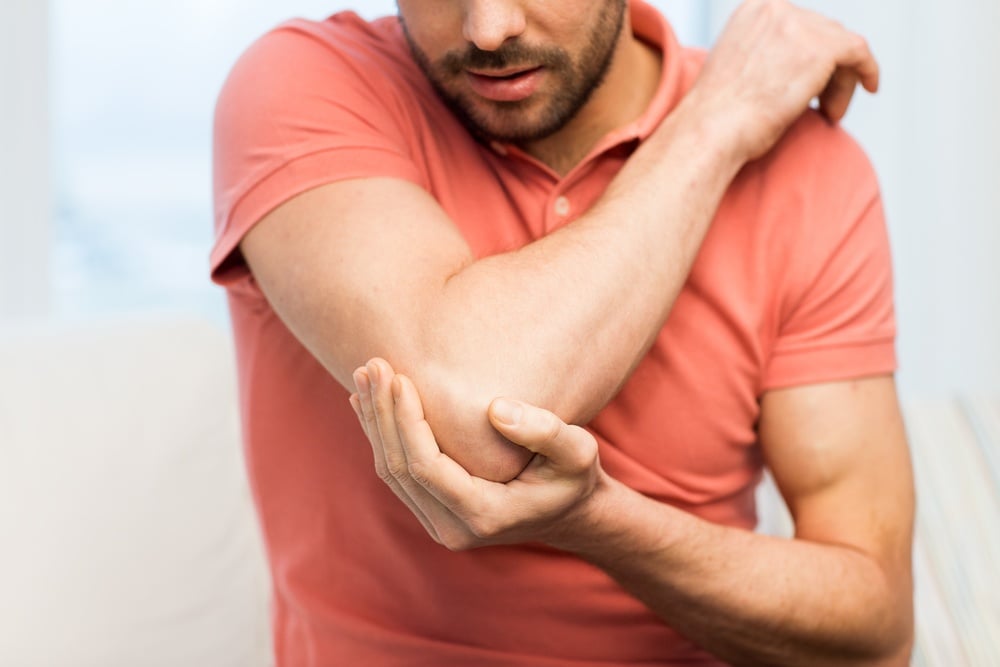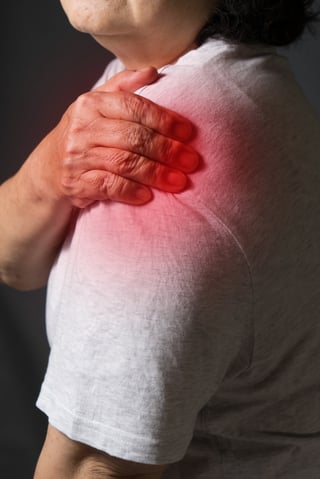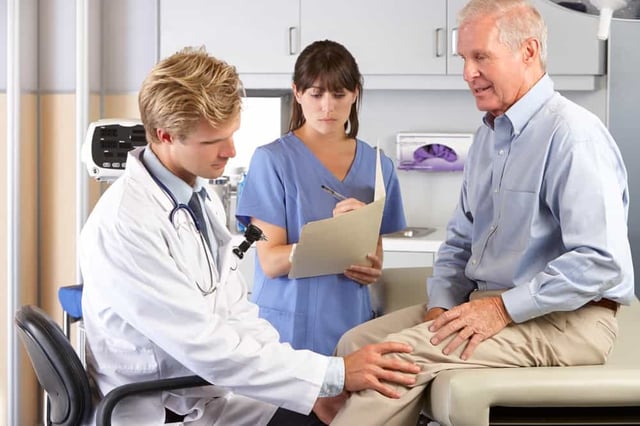Arthralgia (Joint Pain): Causes and Solutions
April 28th, 2016 | 4 min. read

If your joints are aching and sore, or if you're experiencing tenderness, swelling, or stiffness in or around a joint, you have what is called arthralgia — joint pain. Arthralgia can have many causes, including injury, underlying disease, or even allergic reactions or food intolerances.
Arthralgia or Arthritis?
Arthralgia is made up of two Greek words, arthro (joint) and algos (pain). It literally means joint pain, and can refer to any type of pain in the joints. However, for clarification purposes, the United States National Library of Medicine has determined that the term "arthralgia" should be used only to describe joint pain not caused by inflammatory diseases like arthritis.
In spite of this classification, many doctors still use the word "arthralgia" to refer to any type of joint pain. Doctors may use the more general diagnosis of arthralgia, before a more specific diagnosis, or cause of the arthralgia, can be confirmed.
joint pain (arthralgia) symptoms
If you're considering seeing a doctor, you are probably experiencing some of the following symptoms:

- mild ache or soreness
- severe or excruciating pain
- inability to use the limb to walk or carry objects
- limited joint motion
- locking of the joint
- stiffness
- swelling (inflammation)
- tenderness
- warmth around the joint
- weakness
You may find you have symptoms only after taking part in particular activities, like exercising. Conversely, your symptoms may appear for no reason.
Joint pain can be intermittent and gradual, or it can be sudden.
Pain may go away after resting or taking an over-the-counter medication, or it may not respond to pain relievers at all.
Joint pain can fit any of these criteria.
What causes joint pain?
Arthralgia can be caused by injury to ligaments, tendons, or bursae (fluid sacs) around the joints. Pain can also be a sign of inflammation, infection, or an allergic response. Less commonly, pain can be a symptom of cancer or disease.
Conditions that can cause arthralgia
Arthralgia can have many different underlying causes. Some of these can be urgent and may require immediate or urgent care in the form of antibiotics (or other medications) or surgery.
Conditions that may include joint pain as a symptom include:
- allergic reactions to medications or foods
- arthritis, including osteoarthritis; pseudogout (characterized by sudden, painful swelling); psoriatic arthritis (which can accompany the skin condition psoriasis); reactive arthritis (swelling and pain triggered by an infection elsewhere in the body); septic arthritis (a painful infection that traveled to the joint through the bloodstream); or gonoccocal arthritis (caused by gonorrhea)
- bone disease, including avascular necrosis or osteonecrosis (the death of bone tissue due to a lack of blood supply); osteomyelitis (bone infection); Paget's disease of bone (affecting the pelvis, skull, spine, or legs); facet joint disorders (affecting the cervical or lumbar spine)
- cancer (bone cancer or leukemia)
- complex regional pain syndrome, a rare chronic pain condition that can occur after an injury, surgery, stroke, or heart attack (usually affecting an arm or leg)
- dehydration, from illness or from excessive alcohol consumption
- diabetes
- food intolerances, such as gluten intolerance
- gout (a form of arthritis, common in the base of the big toe)
- hypothyroidism or hyperthyroidism
- infections, like Lyme disease (a tick-borne bacterial infection)
- inflammatory diseases like ankylosing spondylitis (fusion of the vertebrae), Adult Still's disease (often affecting wrists), or polymyalgia rheumatica (causing muscle pain and stiffness, most often in the shoulders)

- injury from overuse, like bursitis or tendinitis (sometimes caused by sports injuries), or from trauma, like a dislocation, fracture, sprain, or strain
- immune disorders or autoimmune disease, like lupus, multiple sclerosis (MS), rheumatoid arthritis (adult or juvenile), scleroderma, Sjögren’s disease, sarcoidosis, or mixed connective tissue disease
- insect bites, such as spider bites
- nerve compression (meralgia paresthetica)
- pregnancy and post-pregnancy (postpartum)
- sexually transmitted diseases, like gonorrhea or chlamydia
- viruses, like influenza or HIV
Joint pain can also be environmental; pain from arthritis, bursitis, or old injuries (including bone breaks) can be triggered by barometric pressure changes.
Diagnosing Joint Pain: When to See a Doctor
In most cases, joint pain is not serious or life threatening and can be managed at home with over-the-counter medications and RICE (rest, ice, compression, elevation) therapy or a warm bath.
However, if your pain is accompanied by swelling, redness, or a tenderness and warmth around the joint, see a doctor.
You should see a doctor immediately if you have a joint deformity, you cannot use the joint, or you experience intense pain or sudden swelling.
Your doctor will give you a physical exam and ask you questions to help pinpoint the cause of your pain. For example:
- Is your pain all-over joint pain, or localized?
- If you feel joint pain all-over, is it migratory? (Does it move around?)
- Did your pain have a sudden onset, or was it gradual?
- Do you have any other known health conditions?
- What medications are you taking? (Sometimes, joint pain can be a side effect of medication.)
- Are you experiencing dry mouth or light sensitivity?
- Have you had any rashes?
- Do you have a history of seizures?
The answers to these questions can help your physician make a diagnosis or order lab tests if needed.
Arthralgia: Body Parts Frequently Affected
Achy joints can happen just about anywhere in the body, including:
- ankle
- back/upper and mid spine
- elbow
- fingers (particularly the metacarpophalangeal joint, or MCP — the index finger), knuckles, or thumb (carpometacarpal joint, or CMC)
- foot (metatarsophalangeal joint, or MTP) or toe (especially the big toe)
- hand and wrist
- hip
- jaw (temporomandibular joint, or TMJ)
- knee
- lower back/pelvis (sacroiliac joint, or SI)
- neck
- shoulder (acromioclavicular joint, or AC; sternoclavicular joint, or SC; glenohumeral joint)
Solutions: How to Treat Joint Pain

What are your options for relieving joint pain?
Usually, treatment will focus on addressing on the primary, underlying cause of your pain. If your arthralgia continues after treatment of your condition, a plan for ongoing pain management may be necessary. Some patients may get some relief of pain from the following:
Diet, Nutrition, and Natural Remedies
- dietary or herbal supplements, for example, turmeric or glucosamine chondroitin
- natural/home remedies like essential oils or fish oils (omega 3)
- vitamins
- weight loss
Exercises/Physical Therapy
Exercises, physical therapy (including aquatic therapy), and sports medicine are pain management techniques that may help relieve arthralgia. They will not fix underlying conditions, but they can improve your mobility, stiffness, and soreness.
Medication
Depending on your diagnosis, you may be advised (or prescribed):
- anti-inflammatories (NSAID's)
- antibiotics (for infection)
- antivirals (for viruses)
- corticosteroids like prednisone (for rheumatological diseases)
- pain relievers: over-the-counter (OTC) or prescription
- topicals like capsaicin (a substance found in chili peppers, known to help block pain) or arthritis cream (like Bengay)
Alternately, discontinuing medication may the best way to treat your symptoms, if your joint pain is caused by an allergic reaction.
Surgery: Arthroscopy or Joint Replacement
Although surgery is a last resort for many people, minimally invasive techniques have made it safer and more popular than it was in the past. Each year, over one million Americans have a hip or knee replaced, and an estimated 80% of orthopedic surgeons practice routine arthroscopic surgery on patients.
Joint surgeries that may help relieve your pain include:
- arthroscopic surgery of the knee, shoulder, or ankle
- cervical or lumbar disc surgery
- elbow surgery or wrist surgery
- total hip replacement
- total knee replacement
- shoulder replacement
If you think it may be time to consider surgery, give Coastal Orthopedics located in Corpus Christi, TX a call and ask for a consultation. Our orthopedic specialists can assess your injury and discuss whether joint replacement or other procedures may be options for you. Telephone: 361.994.1166.
Dr. Williams has been practicing orthopedic surgery in Corpus Christi since 1998. After graduating from Texas Tech hereceived his medical degree from the University of Texas at San Antonio. At the prestigious Campbell Clinic located at the University of Tennessee, Dr. Williams completed not only an Orthopedic Surgery Residency, but an additional year of Fellowship Training in Spine Surgery. Dr. Williams is dedicated to creating an excellent patient experience in the office or in the surgery suite.
Topics:


